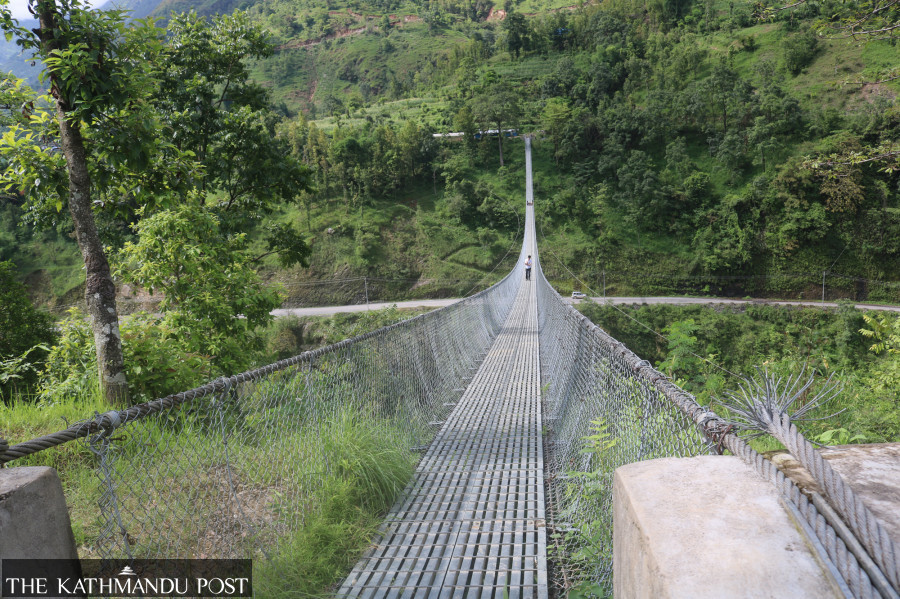National
Federal government handles small bridge projects against the spirit of federalism
But local road projects will be handed over to provinces.
Prithvi Man Shrestha
Undermining the spirit of federalism and decentralisation, the federal government continues to handle small-scale infrastructure projects that are supposed to be executed by provinces and local governments.
The federal government has allocated Rs 7.43 billion for the construction of 1,142 local bridges, most of which are in various phases of construction and 58 new ones, in the next fiscal year 2022-23.
Officials and experts say that part of the problem is the electoral interest of politicians including federal lawmakers, who pressure planners into including such projects in the federal budget.
“We have been insisting that no new local bridge should be added to the list of projects to be implemented by the federal government,” said Arjun Jung Thapa, director general of the Department of Roads. “But we cannot do anything but implement the projects which are included in the federal programme.”
He said that the department was planning to hand over bridges less than 60 metres in length to provincial governments while continuing to implement larger bridge projects.
“If they stopped including small bridge projects under the federal programme, it would be much easier for us to focus on bigger projects, but they have added 58 new bridge projects, which in principle should be implemented by provinces.”
Constitutionally, the federal government is supposed to implement only the roads and bridges that are part of the strategic road network.
Former government secretary Tulasi Sitaula, however, is not averse to the idea of the federal government implementing small bridge projects until the provincial and local governments become capable enough to handle such projects.
“But the central government can train engineers employed under the provincial governments and let them implement the bridge projects,” he said.
“If the federal government itself continues to build small bridges then the provinces will not learn anything,” added Sitaula.
Sitaula also feels the federal lawmakers have vested electoral interest in pushing for inclusion of local projects under the federal programme.
“Federal lawmakers themselves are not taking federalism seriously as they are using federal programmes for personal electoral advantage,” he said.
Experts have questioned the continued presence of local roads and bridge projects under the purview of the federal government saying it is against the spirit of federalism as it keeps financial and human resources with the central government.
Interestingly, the current government has removed around 1,400 local roads, which were included by the previous KP Oli government in the list of projects to be implemented by the central government in the current fiscal year, from next year’s budget.
It had earlier suspended the 1,400 projects through a bill brought in September to replace the budget.
“The execution of 1,400 road projects without studies from the economic and technical point of view, without proper preparatory works and that can be handed over to province and local levels have been suspended. Such projects will be cancelled or handed over to the province and local levels based on necessity and relevance,” the budget replacement bill states.
Also, in the Annual Programmes 2022-23 of the Ministry of Physical Infrastructure and Transport, the government has removed two programmes—Road Infrastructure Development Programme and the Tarai-Madhes Road Infrastructure Special Programme from the central government’s purview.
There were 793 local roads listed under the Road Infrastructure Development Programme and 617 roads under the Tarai Madhes Road Infrastructure Special Programme.
“We have not implemented most of the road projects under these two programmes whose liability has not been created after the contract was awarded,” said Thapa, director general of the roads department.
The federal government has allocated a budget for the Road Infrastructure Development Programme and the Tarai-Madhes Road Infrastructure Special Programme, which would go to the provinces for implementing the road projects under the two programmes.
“As much as Rs2 billion each has been allocated for the two programmes,” said Thapa. It is a clean break from the past trend when the government continued to allocate a budget for the federal government to implement small local projects.
“The handover of the local roads projects to provinces is a good step,” said Sitaula. “The same approach should be taken in the case of local bridge projects too.”




 14.12°C Kathmandu
14.12°C Kathmandu














